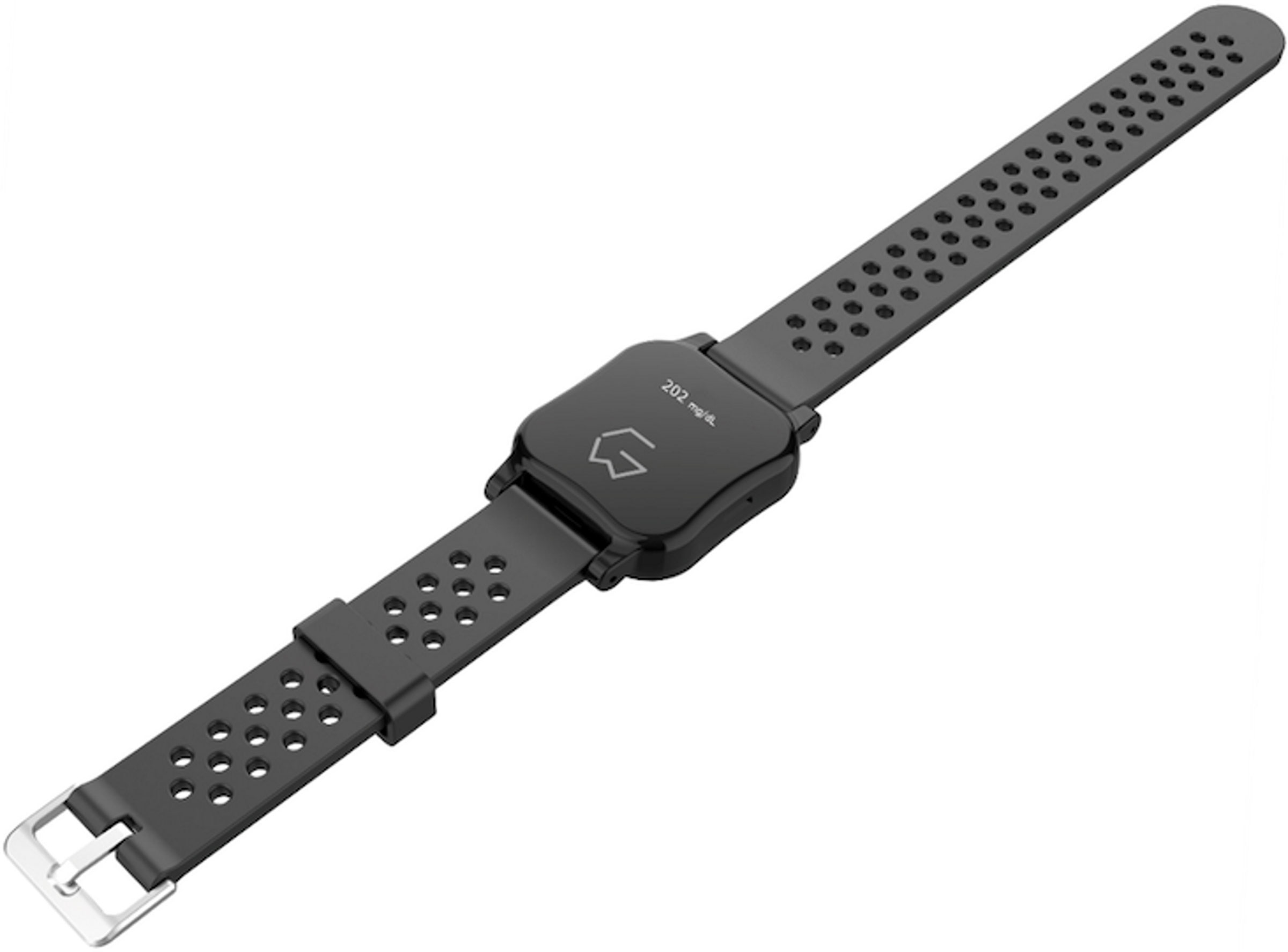MedDevice Department: New Entrant in Non-Invasive Glucose Wearable Race

Numerous companies, from young startups to industry giants like Apple, are vying to be the first to develop a nonintrusive wearable for measuring glucose without invading the body at all. A continuous glucose monitor that doesn’t require pin pricks for blood or under the skin implantables has been long anticipated. This hype earned GraphWear, a 6-year-old company focused on nanotech sensors, a sizable $20.5 million to push their wearable through clinical trials.
GraphWear’s watch uses graphene, a sheet of carbon only one atom thick, to conduct electricity. The powerful conductor pulls molecules from the body closer to the skin where they can be identified and analyzed to measure blood-sugar levels. The watch can gain an accurate reading from just 100 to 200 molecules, but these molecules are from interstitial fluid rather than blood. The American Diabetes Association suggests interstitial values correlate with blood measured values.
First round clinical trial results are not yet available, but GraphWear Co-founder Rajatesh Gudibande says the wearable has produced glucose readings comparable to traditional blood-test methods. The company will apply for FDA clearance and approval following clinical trials.
Patient Pages: Rare Disease Patients Give Pharma Thumbs Up
Pharma has enjoyed a reputation boost in the U.S. since releasing a COVID-19 vaccine in record time and the positive feelings are spreading. Rare disease patients, a group that has become more of a focus of big pharma companies as it has become a rapidly growing market niche, are also feeling good about certain pharma brands. PatientView’s latest survey of 230 rare disease patient advocacy groups tells us that 50% of groups are rating their feelings about corporate pharma as “good” or “excellent” as of February 2021. Additionally, 62% felt that pharma companies were “effective” or “very effective” at supporting their patients through the pandemic; however, some companies ranked better than others in patients’ eyes.
Roche’s Genentech took first place in the hearts of not only rare disease patients, but all patients. So besides being happy with the support received during COVID-19, the company is succeeding in engaging patients and building relationships, even before the pandemic. Alex Wyke, CEO of PatientView, explained that Genentech prioritized patient-centric activities before the pandemic. “When COVID came along, it meant that they could quickly turn around new strategies to help,” she told FiercePharma. For example, in Italy, company officials helped pick up groceries and prescription drugs for cancer patients during lockdown, a cancer patient group reported in another survey. Companies that adapted their treatments to lockdown ranked higher than others. Takeda ranked second and Pfizer ranked third.
Despite the overall positive feedback, rare disease patients had definite areas of concern with the industry. A majority ranked the ability of companies to provide high-quality information to patients as poor. These specific groups reported having questions about how COVID-19 would impact their conditions that largely went unanswered. Pharma companies also scored low in regards to pricing and patient involvement in product development, revealing to companies entering the rare disease space just what is needed of them.
Therapeutic Talk: Patients Are Discouraged by Depression Medications

Trial and error is accepted as unavoidable when it comes to depression medications, but the process itself is a major contributor to mental health challenges. Patients with depression who take an ineffective medication are frustrated (80%), angry (32%), and scared (30%). And only 8% of patients even remain hopeful after a depression medication fails, according to a nationwide survey from GeneSight Mental Health Monitor.
How often does this happen? The survey found that more than half of people diagnosed with depression have tried four or more medications. “Imagine having bronchitis and waiting months to know if the medication prescribed is working. That’s months of coughing, shortness of breath, and feeling sick,” says Mark Pollack, MD, Chief Medical Officer for the GeneSight test at Myriad Genetics. “Yet, that’s what people with mental health problems deal with when trying to find medication that helps them—months of negative thoughts, physical symptoms, and emotional turmoil.”
More than 70% of those diagnosed with depression think it takes weeks or even months to find a medication that works for them, discouraging many from even trying. However, GeneSight Mental Health Monitor found that seven in 10 people with depression would feel “hopeful” if their doctor recommended genetic testing as part of their treatment plan. Gene testing can help assess an individual’s metabolism, or precise needs more quickly than trial and error.
Discoveries/Innovations: First-of-Its-Kind Living Medicine
Scientists declaring, “It’s Alive!,” is typically not a good sign in a horror movie, but in this real-world example it could prove to be a solution to a common problem. About 80% of all infections caused in a hospital setting are from medical implants such as catheters, pacemakers, and prosthetic joints—and these particular infections are highly resistant to antibiotics. However, researchers at the Centre for Genomic Regulation (CRG) and Pulmobiotics S.L have created the first “living medicine” to treat antibiotic-resistant bacteria growing on the surfaces of medical implants by removing a common bacteria’s ability to cause disease and repurposing it to attack harmful microbes instead.
The experimental treatment was tested on infected catheters in vitro, ex vivo, and in vivo, and proved effective in 82% of the tested mice. While the new treatment specifically targets biofilms—since medical implants are ideal growing conditions for these bacteria—the researchers hypothesize that the bacteria can be modified to target different diseases for future applications.
FDA Update
Drug Approvals
The FDA approved Tecartus (brexucabtagene autoleucel) from Kite Pharmaceuticals for adult patients with relapsed or refractory B-cell precursor acute lymphoblastic leukemia. The treatment is an intravenous CAR-positive viable T cells therapy given over three months.
The Repatha (evolocumab) injection received FDA approval to treat patients 10 years and older with heterozygous familial hypercholesterolemia (HeFH) and homozygous familial hypercholesterolemia (HoFH). These are rare, life-threatening diseases caused by gene mutations that keep the body from clearing away cholesterol, resulting in high levels of low-density lipoprotein cholesterol (LDL-C) or “bad cholesterol.” Amgen’s Repatha is a subcutaneous injection that has been approved since 2015 to reduce risk of cardiovascular disease and is known to lower LDL-C. It can now be used in combination with diet management and other therapies to treat HeFH and HoFH.
Incyte Corp. received FDA approval for Jakafi (ruxolitinib), a treatment for chronic graft-versus-host disease (cGVHD) in patients 12 and older. The drug is to be used after one or two systemic treatment failures, for those who experience cGVHD after an allogeneic, or bone marrow and/or blood stem cells, transplant.
Med Device Approvals
For the first time in nearly a decade, the FDA cleared a technological advancement in Computed Tomography (CT) imaging. CT scans are used on any point of the body for diagnostics using X-rays transformed into images. The new photon-counting CT scanner Naeotom Alpha from Siemens Medical Solutions reads every X-ray sent through a person’s body rather than all X-rays at once as traditional systems do, improving the detail of images while reducing information that is not useful.








